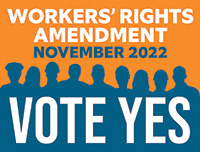By MIKE MATEJKA
 Should workers have a right to speak out about safety conditions, organize together and negotiate with their employers? That is the question of the Workers’ Rights Amendment on this upcoming election ballot.
Should workers have a right to speak out about safety conditions, organize together and negotiate with their employers? That is the question of the Workers’ Rights Amendment on this upcoming election ballot.
By placing workers’ rights in the Illinois Constitution, future state legislators or governors cannot circumvent or thwart workers’ basic concerns.
Fundamentally, this is a question of democracy. Democracy is not just voting every few years. Democracy is people having a voice. Where do we spend most of our waking hours – at work.
Here’s a pertinent question for any worker: “Is democracy practiced at my workplace?” In most cases, the answer is no. The employer determines the hours, wages, dress code and the rule book. A sympathetic employer might listen to workers’ concerns but is not obligated to do so.
So how does one gain those basic American democratic workplace rights? By organizing. Workers together can form their own organizations, elect representatives, meet with their employer and negotiate wages, hours and working conditions. Those worker organizations are called Labor unions. The Workers’ Rights Amendment would codify those rights within the Illinois Constitution, protecting workplace democracy.
One can see how important a voice on the job is with the current railroad workers’ situation. A railroad job pays well, but workers want a life. Being on call 24/7 with no flexibility for family needs, medical care or simply relaxation time is driving workers from this industry. The workers are currently negotiating and voting on their contracts. Money is not the paramount issue, the core issue is having control of one’s life. Because they are organized, rail workers meet management at the bargaining table to hopefully compromise. Democracy means these workers get the final say, through a contract vote.
By voting yes on Amendment 1, these fundamental workplace rights become more than law in Illinois, they are constitutionally protecting.
Workers’ Rights Amendment opponents have raised the weak and false issue of increased taxes. There is nothing in this amendment that impacts taxes directly. This is a long-used fear tactic to evade the real issue, which is giving average working people a voice.
The other tactic is claiming employers will flee the state. That’s an old argument that doesn’t prove true. One hundred-plus years ago when Illinois was a child labor law pioneer, opponents argued that this would ruin business. In 1937 when Illinois passed unemployment insurance, the Illinois Manufacturers Association (IMA) stated no one would work anymore. In the Chicago Tribune in 1932 the IMA was quoted, saying, “Unemployment insurance laws would undermine the fabric of our economic and social life by destroying initiative, discouraging thrift, and stifling individual responsibility.”
Don’t be fooled by misleading arguments. This is a basic question of democracy. Voting yes for the Workers’ Rights Amendment means basic protections. It could transform conditions for many low-wage workers. Raising economic standards for workers means a stronger, fairer and more prosperous Illinois.
(Reprinted from the Bloomington Pantograph with permission of the author.)

